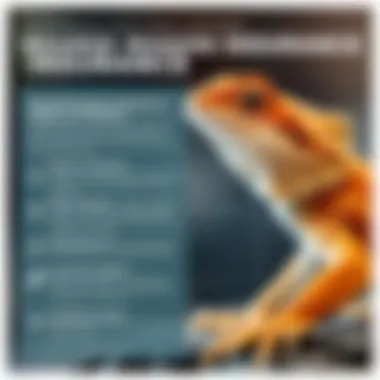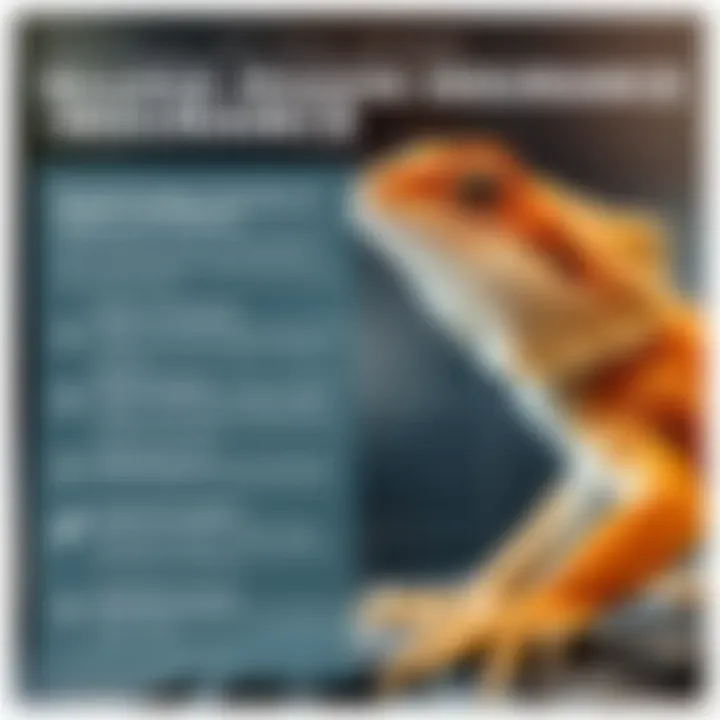Bearded Dragon Insurance: A Guide for Pet Owners


Intro
Owning a bearded dragon presents a unique experience, blending joy with responsibility. As reptile enthusiasts know, these fascinating creatures require tailored care, especially regarding their health. One important aspect that sometimes gets overlooked is the notion of insurance. Many pet owners will go the extra mile to ensure their furry friends are insured for health concerns, but it's essential to extend that care to our scaly companions too.
Understanding bearded dragon insurance involves more than simply understanding the policies available; it dives into the broader realm of pet wellness. Providing care and ensuring proper nutrition are paramount to prevent health issues before they arise. Given the rapid advancement in the field of pet care, it's crucial to stay informed about coverage options that cater specifically to bearded dragons. This article sheds light on how insurance can positively impact their well-being, alongside practical advice to navigate the complexities of pet insurance in general.
As we journey through the landscape of bearded dragon insurance, we will explore why it's significant, what to consider when selecting a policy, different coverage types, and some general health management strategies. The path may be winding, but with the right guide—this article—you can feel prepared and informed about the important decisions that lie ahead.
Let's dive into the first topic to understand the synergy between care and insurance.
Preamble to Bearded Dragon Insurance
Owning a bearded dragon is a unique journey into the world of exotic pets. Bearded dragons are more than just creatures to display; they are companions that require dedicated care and attention. As such, their health should be a top priority for any owner. This is where the concept of bearded dragon insurance enters the scene, offering peace of mind and financial security for pet owners. Understanding the intricacies of this type of insurance is not just helpful; it's essential for anyone considering bringing one of these fascinating reptiles into their lives.
Getting familiar with bearded dragon insurance helps pet owners grasp the potential financial implications of reptile ownership. It prepares them for unexpected veterinary costs that can arise from illness, accidents, or age-related issues. By diving into this topic, pet owners can make well-informed decisions about purchasing coverage, ensuring their beloved companions receive the necessary care without breaking the bank.
A bearded dragon's well-being can be significantly improved by embracing the right insurance policy. This not only protects the animal but also nurtures the bond between pet and owner. After all, health challenges can arise even in the best-managed habitats. Therefore, understanding the nuances of insurance becomes a vital aspect of responsible pet ownership.
What is Bearded Dragon Insurance?
Bearded dragon insurance specifically caters to the unique health needs of these reptiles. Similar to health insurance plans for dogs and cats, it provides financial support for veterinary services, including emergency care, general check-ups, and treatments for both common and rare conditions.
There are certain key features that set bearded dragon insurance apart:
- Coverage for Illness and Accidents: Policies often include coverage for unexpected events, such as snake bites or metabolic bone disease, which are not uncommon in this species.
- Routine Care Benefits: Some plans offer coverage for regular vet visits and routine examinations, ensuring that pet owners can maintain their dragon's health while managing costs.
- Flexible Plans: Various insurers allow pet owners to choose options that cater specifically to their needs, be it accident-only coverage or comprehensive plans that take everything into account.
Importance of Health Insurance for Pets
Health insurance isn’t just about handling surprise vet bills—it’s a lifeline that can impact a pet’s health and longevity. Understanding the significance of health insurance for bearded dragons can empower owners to take proactive steps. Here are a few points to consider:
- Financial Security: Veterinary care for reptiles can be expensive, particularly if a significant health issue arises. Insurance alleviates the financial burden, giving owners the luxury of focusing on their pet's recovery rather than fretting over costs.
- Timely Treatment: With insurance, owners are more likely to seek help sooner rather than later. No one wants to delay a vet visit out of fear of high costs. Insurance provides the option to seek timely professional advice whenever needed.
- Less Stress for Owners: Knowing that one has insurance coverage can significantly reduce a pet owner's stress. They can focus on what matters most—the well-being of their bearded companion.
In short, exploring bearded dragon insurance is a crucial step in responsible pet guardianship. It helps ensure that these remarkable reptiles receive the required care while protecting their human companions from potential financial strain. The health of a bearded dragon is intricately tied to informed and prepared ownership.
Understanding the Risks of Bearded Dragon Ownership
Owning a bearded dragon is not just about enjoying their quirky personalities or fascinating looks; it involves a deep understanding of their specific needs and potential health risks. Recognizing these challenges can help pet owners make informed decisions, ensuring their pets stay healthy and happy. As much as these reptiles are resilient, they can also face various health issues that can arise from their environments, diet, and genetics. Hence, it’s crucial to take a deeper dive into the risks that come with bearded dragon ownership, particularly how it relates to their health and imperative need for insurance.
Common Health Issues in Bearded Dragons
Bearded dragons are typically robust pets, but they are susceptible to certain health complications. Some of the prevalent health issues that owners should keep an eye on include:
- Metabolic Bone Disease (MBD): Caused by a calcium deficiency, MBD leads to weakened bones, making them prone to fractures.
- Respiratory Infections: Often a result of improper habitat conditions, these infections can exhibit symptoms like lethargy and difficulty breathing.
- Parasites: Internal parasites such as worms can adversely impact their health, leading to weight loss and other serious symptoms.
- Tail Issues: Known as “tail autotomy,” bearded dragons may drop their tails when stressed or threatened, leading to potential infections.
Being aware of these conditions can empower owners to seek prompt veterinary assistance. Regular check-ups, as well as observant monitoring of dietary habits and environmental settings, can significantly reduce the likelihood of these issues arising.
Potential Costs of Veterinary Treatment
The costs associated with veterinary care for a bearded dragon can quickly add up. Understanding these expenses can greatly influence your decision on whether to purchase insurance or not. Here’s what pet owners should consider:
- Routine Check-ups: Basic annual visits can range from $50 to $200, depending on the vet's expertise and location.
- Emergency Care: If your pet faces a medical emergency, treatment can easily exceed $1,000. In some cases, hospitalization or specialized treatments may be necessary, driving costs up even further.
- Medications: Prescription medications can range from $10 to $100, not to mention possible recurring costs if long-term treatment is needed.
- Surgeries: For serious conditions like MBD or parasite infections, surgical intervention may be necessary, and those bills could skyrocket to $2,500 or more.


"Prevention is better than cure" is a mantra many bearded dragon owners should embrace. By understanding the potential health issues and costs involved, you can better prepare your finances and considerations for insurance.
Understanding these risks is paramount in being a responsible pet owner. Ensuring your bearded dragon is healthy, along with proper housing and nutrition, can greatly reduce the need for costly vet visits. With such knowledge at hand, insurance can serve as a safety net against the unpredictable nature of pet care.
Types of Coverage Available
When it comes to bearded dragon insurance, understanding the types of coverage is crucial for any responsible pet owner. Just like any other aspect of animal care, insurance can significantly influence the financial and overall well-being of your pet. With numerous options available, knowing the specifics is what helps you ensure that your beloved bearded dragon is well protected.
Accident-Only Insurance
Accident-only insurance offers a basic level of coverage aimed at unforeseen incidents. This type of policy generally covers accidents leading to injuries, such as fractures or bites. While it might be more affordable compared to other plans, it does stow away a few limitations that owners should consider before jumping in. Critics often argue that only covering accidents isn't sufficient; after all, they get into trouble often enough that one mishap could be financially draining without extra protection. Suppose your dragon narrowly escapes a mishap, but later develops a health issue due to stress; that would likely fall outside of such a policy's parameters.
To illustrate, here’s a hypothetical scenario: If your bearded dragon ingests something it shouldn't, like a piece of cardboard, an accident-only plan will kick in for the expenses related to surgery or treatment stemming from that exact incident. However, any underlying health concerns that may arise later wouldn't be covered.
Comprehensive Health Insurance
Unlike accident-only plans, comprehensive health insurance takes a holistic view of your pet’s health. This type of policy typically covers various scenarios like illnesses, accidents, diagnostic testing, and sometimes, even routine vet visits. Such coverage is essential for pet owners who want peace of mind against unexpected charges sprouting up due to health fluctuations.
For instance, if your bearded dragon develops metabolic bone disease, which is quite common, a comprehensive policy should ideally cover diagnostic procedures and treatment, even if it requires specialized care. While premium rates may be higher than accident-only insurance, the benefits might far outweigh the costs once an unfortunate event occurs. Because who wants to choose between getting your pet the needed care and worrying about the bills?
Wellness Plans and Preventive Care
Wellness plans offer another layer of security. These are not quite insurance in the conventional sense but can be incredibly useful in promoting the long-term health of your bearded dragon. Typically, they cover preventative services, such as routine check-ups, vaccinations, or nutritional counseling, which might help catch issues before they become serious.
For instance, investing in a wellness plan can lead to better diet management for your pet. If a vet evaluates your bearded dragon's diet and suggests changes to improve health, that service would typically fall under such a plan. Moreover, just like taking your car in for regular maintenance can help prevent bigger issues, these preventative measures might mitigate future costly treatments.
Remember, a small investment in preventive care can save you from hefty expenses later on.
Ultimately, the type of coverage you opt for should align with your goals as a pet owner, the specific needs of your bearded dragon, and your budget constraints. By having this comprehensive knowledge of insurance options, you equip yourself better to make wise decisions regarding the care of your scaly friend.
Evaluating Insurance Providers
Understanding how to evaluate insurance providers is crucial for bearded dragon owners. This process can help you make informed decisions that align with your unique circumstances and your pet's needs. Various companies offer different coverages, and knowing how to sift through these options can save not only money but also headaches in the future.
When considering insurance, it’s essential to factor in how reputable and reliable the company is. A provider with a solid track record often means better service when it counts, especially during claims processes. You wouldn’t want to be caught with an unreliable company when your beloved pet is in need of immediate care. Furthermore, it’s important to think about the specifics of what each insurance policy covers. Some plans might look great on paper but lack essential coverage when it comes to certain treatments or care.
Reputable Companies in the Market
When it comes to reputable companies in the pet insurance market, a few names generally stand out. Providers like Pets Best, Trupanion, and Healthy Paws often receive positive feedback from pet owners, particularly those who own reptiles like bearded dragons. These companies usually offer comprehensive plans that suit many needs, including coverage for accidents, illnesses, and even specialized treatments.
It's a good practice to read reviews and seek feedback in online communities. For example, Reddit hosts various threads discussing personal experiences with these companies. Engaging with such platforms can offer unique insights that are not typically highlighted in marketing materials. Some aspects to consider while evaluating these companies include their claim payout ratios, customer service responsiveness, and how often you’ll need to deal with exceptions in coverage.
Reading Policy Fine Print
After narrowing down your options, the next step is reading the fine print. It may not be the most exciting part, but reviewing the details of the policy can save you from encountering unexpected issues later on.
Pay particular attention to any exclusions. Does the policy cover congenital diseases common in bearded dragons? How about pre-existing conditions? There’s often a lot of jargon in these documents, so it can be helpful to take notes and clarify terms that seem vague. If you’re unsure about certain points, don’t hesitate to reach out to customer service or ask questions.
Additionally, look for details regarding premiums and deductibles. Understand how that might affect your ability to file a claim and how quickly you’ll need to pony up if your bearded dragon needs immediate care.
"Knowledge is power, and being well-informed influences both your budget and your pet's health outcomes."
By taking these considerations into account, pet owners not only equip themselves with valuable information but also secure a safety net for their bearded dragons, ensuring they get the best care possible.


Cost Considerations
Navigating bearded dragon insurance brings forth the term 'cost considerations.' This is not merely about the dollars and cents; it encompasses the intricate web of financial insights related to the care of these delightful reptiles. Pet owners must grapple with several factors when evaluating the affordability and necessity of insurance for their scaly friends. From potential vet bills to peace of mind, understanding the financial implications can be essential for responsible ownership.
Factors Affecting Premiums
When diving into pet insurance premiums, several elements play a pivotal role in determining costs. Here’s a closer look at what influences these prices:
- Age of the Dragon: Like humans, younger bearded dragons may command lower premiums. Insurers assess risk based on age, with younger pets generally facing fewer health issues.
- Pre-existing Conditions: If a pet has health issues already, it can significantly hike the insurance costs or make it impossible to find a policy that covers those issues.
- Type of Coverage Chosen: The choice between accident-only policies and more comprehensive plans can impact the price. Comprehensive plans, offering wider coverage, typically come with higher premiums.
- Geographic Location: Veterinary care prices can vary widely depending on where you live. Urban areas might have higher healthcare costs, which can reflect in the insurance pricing.
- Provider Variance: Different insurance companies have differing pricing structures, so it may pay off to shop around. One company might offer a better deal for your specific needs than another.
It's valuable for pet owners to closely consider these factors when estimating the overall insurance budget for their bearded dragons.
Is Insurance Worth the Cost?
Determining whether the expense of insurance is justified often depends on the unique situation of each pet owner. Here are some elements to ponder:
- Potential Veterinary Costs: Veterinary treatments for bearded dragons can be surprisingly expensive. Complex surgeries or prolonged illnesses can drain finances quickly. Here, insurance may serve as a safety net against high costs.
- Chronic Conditions and Conditions: If your bearded dragon is prone to health issues or has a history of illnesses, insurance might be a sensible strategy. This offers assurance and supports proactive health care without constantly stressing your budget.
- Peace of Mind: Often, the value of insurance isn’t only about the financial aspect. The peace of mind knowing that your pet's health can be addressed without unbearable financial strain provides a sense of courage to pet owners.
- Planned vs. Unplanned Expenses: While some owners may be able to set aside emergency funds, insurance can help mitigate sudden unexpected costs that can arise from accidents or sudden illnesses, keeping financial burdens from becoming overwhelming.
When considering whether pet insurance is worth it, every owner must weigh these pros and cons against their individual circumstances, ultimately leading to enlightened decisions about healthcare for their cherished bearded companions.
Submitting a Claim
When it comes to bearded dragon insurance, the process of submitting a claim is a vital component that all pet owners should grasp thoroughly. Understanding this process not only simplifies the intricacies of dealing with insurance but also maximizes the benefits derived from it. Submitting a claim brings the promise of coverage into action, allowing owners to alleviate some of the financial burdens associated with unexpected veterinary expenses or emergencies. The insights provided in this section will shed light on the essential steps involved and the considerations that come into play.
Claim Process Explained
The claim process can feel like a maze at first glance, but breaking it down can help demystify it. Here’s how it generally works:
- Gather Relevant Documentation: This might include your policy number, detailed invoices from your veterinarian, and any medical records related to your bearded dragon's condition. The more information you can provide, the smoother the process tends to go.
- Fill Out the Claim Form: Each insurance provider typically has its own claim form. It’s advisable to read the instructions carefully on how to fill it out. Make sure every field is completed to avoid any delays.
- Submit the Claim: Claims can usually be submitted online, via email, or through postal mail. Each method might have its own processing time, so consider what works best for your circumstance.
- Follow Up: After submission, it is wise to follow up with your insurance provider. They can give you the lowdown on when to expect a decision or if they need more information from you.
A handy tip is to keep duplicates of all documents sent to the insurance company, just in case. Also, do check average processing times for your specific insurance provider.
Common Challenges in Claim Submissions
Even with the best preparations, submitting claims can have its bumps along the road. Here are some challenges one might face:
- Incomplete Documentation: Forgetting a single invoice can lead to delays or denials in claims. Careful organization beforehand can save a lot of headaches.
- Policy Limits: Each insurance policy has its limits on what can be claimed. Often, pet owners may be unaware of coverage exclusions or specific conditions that aren't covered. Make sure to read the fine print thoroughly.
- Communication Gaps: Miscommunication can happen between pet owners and insurance companies. Sometimes, it could stem from unclear instructions on either side. Building rapport with a claims representative can ease this process.
- Processing Delays: The waiting game can be frustrating. Factors like high claim volumes or complicated claims can slow things down. Keeping the communication lines open encourages quicker resolutions.
Ultimately, being forearmed with knowledge about the claims process aids pet owners in navigating potential pitfalls, ensuring that their beloved bearded dragons receive the health care needed in times of crisis.
This understanding is pivotal in assisting pet owners to feel more empowered and educated regarding the insurance landscape. With clarity about what lies ahead, the stress of dealing with a potential claim dwindles, allowing owners to focus more on their dragon’s needs.
Alternatives to Insurance
When it comes to bearded dragon ownership, the question of insurance might loom large. However, it’s important to recognize that insurance isn't the only option on the table. Many owners find themselves exploring alternatives that can also provide support in times of need. In this section, we’ll dive into some viable alternatives to insurance, discussing their benefits, considerations, and how they can effectively safeguard your pet without a traditional insurance policy.
Emergency Funds for Pet Care
Creating an emergency fund can be one of the smartest moves a pet owner can make. This is money set aside specifically for unexpected medical or health-related issues that your bearded dragon may encounter.
The idea is relatively straightforward: save a little each month, much like saving for a rainy day. This specific fund can help ease the financial burden during emergencies, ensuring that your beloved lizard gets the care it needs without the maddening stress of scrambling for funds. Here are some key reasons to consider an emergency fund:
- Immediate Availability: Unlike insurance claims that can take time, having cash on hand means you can address medical emergencies right away.
- No Limits or Restrictions: With an emergency fund, you don’t have to worry about deductible limits or coverage exclusions that might come with insurance policies.
- Customizable Savings: You can choose a figure that suits your finances comfortably. Tweak your savings goals based on your bearded dragon’s health history or previous medical emergencies.


Setting a savings goal could be based on common treatments or expenses associated with bearded dragons, such as vet visits or medication. If all goes smoothly and the funds aren't needed, well, that’s a win-win!
Comparing Insurance to Alternative Options
While insurance may fit some pet owners like a glove, alternatives such as emergency funds often fit even more snugly. This doesn’t mean that insurance isn’t valid; rather, it highlights the need to weigh your options carefully. Here are some aspects to consider when comparing:
- Cost Effectiveness: Emergency funds require upfront planning, but they don't incur ongoing monthly premiums like insurance. Many owners find that saving a bit every month can be far less burdensome than a premium that drains their pockets.
- Simplicity and Control: With an emergency fund, you decide what treatments to engage in without worrying about what’s covered or not. You have the ultimate say in how to allocate those funds.
- Coverage Versatility: An emergency fund can be used for various expenses that arise, not just vet visits. This can include habitat upgrades or specialty diets that your lizard might need from time to time.
In the end, whether you choose to go the insurance route or rely on an emergency fund is a personal decision. It’s critical to consider your financial situation, your comfort level with risk, and your bearded dragon's unique needs.
"While insurance can offer peace of mind, sometimes self-sufficiency presents its own kind of security."
A careful evaluation of both options gives you the clarity to make an informed choice. Whether you crank out a budget plan for an emergency fund or dive into researching policies, remember that each route carries its weight and will greatly contribute to your pet's wellbeing.
Legal and Ethical Considerations
Understanding the legal and ethical obligations tied to pet ownership, particularly for exotic pets like bearded dragons, plays a crucial part in responsible management of these unique companions. The complexities around this topic can seem daunting at first glance; however, these considerations act as a guiding light for pet owners striving to meet the welfare needs of their reptiles while remaining compliant with applicable laws.
Understanding Animal Treatment Laws
One of the key frameworks around pet ownership revolves around animal treatment laws, which vary by region. Generally, these laws dictate how animals should be cared for, including their health care, housing, and even transportation. For bearded dragon owners, knowing local statutes is vital. This knowledge not only safeguards against legal repercussions but also ensures that the reptile receives the quality of life it deserves.
In many places, provisions require that owners provide adequate food, suitable living conditions, and necessary medical care. Failure to adhere to these regulations can result in penalties, and in severe cases, confiscation of the pet. In this light, having bearded dragon insurance can play a passive yet vital role. It can help mitigate costs associated with medical care, wherein briefly scanning through local laws can save you from potential fines or harsher actions.
To dig deeper, you might want to check resources like animal law research or consult local agencies that deal with wildlife preservation and animal health.
Ethical Obligations as Pet Owners
Beyond legal frameworks lies the ethical dimension of bearded dragon ownership. Ethical obligations encompass a series of duties that go beyond compliance with laws. It’s about fostering an environment where the small creature can thrive, feel safe, and live a fulfilling life.
- Here are some ethical responsibilities pet owners should consider:
- Educational Commitment: Understanding species-specific needs is crucial. Not all reptiles are alike, and specific care guidelines, like heat and light requirements for bearded dragons, should be followed.
- Informed Decision-Making: Choosing to adopt or buy a bearded dragon should be a well-considered decision. Many owners forget about the long-term commitment involved in caring for these reptiles.
- Providing Veterinary Care: Regular veterinary check-ups, along with emergency considerations, should be prioritized. Having insurance may alleviate some financial burdens, encouraging prompt medical interventions.
"An ethical owner goes beyond basic requirements, fostering the best possible quality of life for their bearded dragon."
Adhering to these ethical standards—while ensuring compliance with legal obligations—enriches not only the lives of these creatures but also fosters a deeper bond between pet and owner. Engaging with local reptile communities, like those found on Reddit, can further enhance your knowledge and responsibility as a pet owner.
Best Practices for Bearded Dragon Owners
Ensuring the well-being of a bearded dragon goes beyond the immediate aspects of care such as feeding and housing. It's a multifaceted responsibility that requires consistent attention to health and environment. By implementing best practices, owners can fortify their pet's health and lay a solid foundation for longevity and happiness. Engaging in proactive measures not only minimizes the chances of developing health issues but enhances the pet-owner bond as well.
Regular Health Check-ups
Regular health check-ups are pivotal in maintaining the health of bearded dragons. These check-ups serve multiple purposes:
- Early Detection: By frequently visiting a veterinarian specialized in reptiles, any lurking health problems can be caught early. This might include issues like respiratory infections or parasites, which can escalate if not addressed promptly.
- Monitoring Growth and Development: Especially for younger dragons, these visits help track their growth and ensure they’re developing normally. A vet can provide tailored advice on diet and habitat if there are concerns about weight or behavior.
- Preventive Care: Often, the vet might recommend vaccinations or preventive treatments, helping avoid future illnesses. Even reptiles can fall victim to viral and bacterial infections, making preventive measures essential.
In simple terms, regular check-ups act as your best defense against unexpected health crises. They can save a lot of heartache—and dollars—down the line.
Living Environment Maintenance
The living environment plays an undeniably vital role in the health of bearded dragons. After all, these creatures thrive in specific conditions that mimic their natural habitat. Focus on these key aspects:
- Temperature Regulation: Bearded dragons thrive in a heat gradient. Make sure there are basking spots as hot as 110°F (43°C) while cooler areas should hover around 75°F (24°C). A thermometer can do wonders in maintaining these temperatures.
- Humidity Control: Unlike many reptiles, bearded dragons benefit from low humidity levels. Aim for around 30-40% to prevent respiratory issues. Mist the enclosure lightly sometimes but avoid excessive moisture, which can lead to skin problems.
- Cleanliness: Regular cleaning is essential to prevent the accumulation of bacteria and parasites. A simple weekly scrub with non-toxic cleaner can help maintain a hygienic environment. Don't forget to spot-clean daily; it's quick and helps keep things fresh.
- Enrichment and Stimulation: Adding elements such as hides, climbing structures, and interactive decor can stimulate their curiosity and reduce boredom. A happy dragon is one that has interesting spaces to explore.
"A healthy dragon is a happy dragon." It’s crucial to create a habitat that encourages activity and promotes stress-free living.
In summary, focusing on regular health check-ups and diligent living environment maintenance not only improves the overall health of bearded dragons but cultivates a better relationship between pets and their owners. These are not just pets; they are cherished companions that deserve the best care possible.















